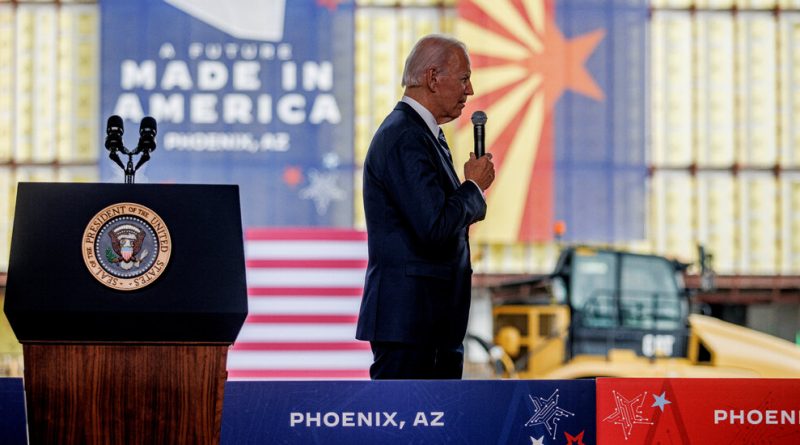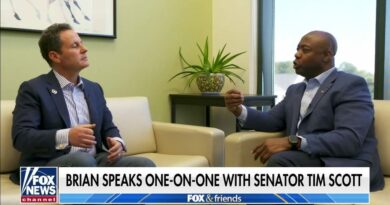Biden’s Reluctant Approach to Free Trade Draws Backlash
WASHINGTON — Since President Biden came into office two years ago, the United States has declined to pursue new comprehensive free-trade agreements with other countries, arguing that most Americans have turned against the kind of pacts that promote global commerce but that also help to send factory jobs overseas.
But in recent months, with the rollout of a sweeping climate bill intended to bolster clean energy manufacturing, the lack of free-trade agreements with some of America’s closest allies has suddenly become a major headache for the administration.
The dispute, which centers on which countries can receive benefits under the Inflation Reduction Act, has caused significant rifts with foreign governments and drawn blowback from Congress. And it is helping to reignite a debate over whether the United States should be working to break down trade barriers with other countries — or keep them intact in an attempt to protect American workers.
The law as written offers tax credits for electric vehicles that are built in North America or that are made with battery minerals from the United States and countries with which it has a free-trade agreement.
Those provisions have angered allies in Europe and elsewhere that, despite close ties with America, do not actually have free-trade agreements with the United States. They have complained that companies in their countries would be put at a disadvantage to U.S. firms that can receive the subsidies. To soothe relations, the Biden administration has developed a complicated workaround, in which it is signing limited new trade deals with Japan and the European Union.
But that solution has vexed lawmakers of both parties, who say that these agreements are not valid and that the administration needs to ask Congress to approve the kind of free-trade agreement the law envisions.
“It’s a fix,” said Edward Alden, a senior fellow at the Council on Foreign Relations who specializes in trade, adding that they were not free-trade agreements “by any reasonable definition of the term.”
The World Trade Organization defines a free-trade agreement as covering “substantially all trade” between countries. In the United States, such broad agreements need the approval of Congress, though the executive branch has the authority to negotiate much narrower agreements.
Administration officials argue that because the Inflation Reduction Act does not define the term “free-trade agreement,” these narrower pacts are allowed. But in hearings before the House and the Senate last month, lawmakers criticized the administration for bypassing Congress in making these agreements.
Some lawmakers argued for more traditional free-trade deals, while others voiced support for new deals with higher labor and environmental standards, like the North American agreement Congress approved in 2020.
In her opening statement at the hearings, Katherine Tai, the United States trade representative, set out a vision for a trade policy that was different from those of previous administrations, focused more on defending American workers from unfair foreign competition than opening up global markets. Ms. Tai said she and her colleagues were “writing a new story on trade” that would put working families first and reflect the interests of a wider cross section of Americans.
Speaking before the Senate on Thursday, Ms. Tai said she remained “open minded” about doing more trade agreements if they would help address the challenges the country has today.
The Biden Presidency
The Biden administration has long insisted that past approaches to trade policy — in which other countries gained access to the U.S. market through low or zero tariffs — ended up hurting American workers and enriching multinational companies, which simply moved U.S. jobs and factories overseas. In contrast, Biden officials have pledged to strengthen the economy and to make the country more competitive with China by expanding the country’s infrastructure and manufacturing, rather than negotiating new trade deals.
How Times reporters cover politics. We rely on our journalists to be independent observers. So while Times staff members may vote, they are not allowed to endorse or campaign for candidates or political causes. This includes participating in marches or rallies in support of a movement or giving money to, or raising money for, any political candidate or election cause.
The administration is currently negotiating trade frameworks for the Indo-Pacific region and the Americas, and is engaging in trade talks with Taiwan, Kenya and other governments. But, to the dissatisfaction of some lawmakers in both parties, none of these agreements are expected to involve significantly opening up foreign markets by lowering tariffs, as more traditional trade deals have done.
Representative Adrian Smith, a Nebraska Republican who leads the House Ways and Means trade subcommittee, said in the hearing that he was concerned the United States had “lost momentum on trade” even as China continued to aggressively broaden its own partnerships.
“I cannot express strongly enough,” he added, “that the administration cannot just come up with new definitions of what a trade agreement is for some reason, and certainly not to give handouts for electric vehicles.”
“You have to appreciate that we live in a very different world,” Ms. Tai responded. She said the Biden administration sought to adapt its policies to respond “to the world we’re living in, and not the world that we want to live in.”
Part of the pressure stems from the fact that other countries — including China — are continuing to pursue more traditional trade deals that lower their tariffs with trading partners, giving their companies an advantage over businesses based elsewhere. On Friday, British officials announced that they had reached an agreement to join a Pacific trade pact that, despite being devised by the Obama administration, does not include the United States.
Membership in the so-called Comprehensive and Progressive Agreement for Trans-Pacific Partnership will allow Britain to export products tariff-free to 11 other countries. With the inclusion of Britain, the pact will represent 15 percent of the global economy, British officials said.
Jake Colvin, the president of the National Foreign Trade Council, a U.S. group that lobbies on behalf of major multinational companies, called the news “a stark reminder that the world isn’t waiting for the United States.”
“While we congratulate the U.K. government for being part of this massive agreement, it’s frustrating to see America’s allies writing global rules and creating new market opportunities without the United States,” he said.
Politicians of both parties have found support for free-trade agreements to be controversial in the United States in recent years. The Trans-Pacific Partnership — the original deal negotiated by the Obama administration with 11 other nations circling the Pacific Ocean — received criticism from labor unions and other progressive Democrats who said it would ship jobs overseas. Hillary Clinton opposed it as a candidate in the 2016 presidential election.
As president, Donald J. Trump also criticized the deal and officially withdrew the United States from it in 2017. He also scrapped a negotiation over a comprehensive trade deal the Obama administration had been carrying out with the European Union.
Mr. Trump went on to sign a series of limited trade deals with Japan and China without congressional approval. He also oversaw an update to the North American Free Trade Agreement that was ratified by Congress, which he named the U.S.-Mexico-Canada Agreement.
Democrats also came to support that deal after adding significant protections for workers and the environment.
Some trade experts have speculated that the Biden administration will try to build on the success of the U.S.M.C.A. by adding more nations to the pact, or by applying its terms to negotiations elsewhere. But so far, the Biden administration has not announced any such plans.
Two top Democratic lawmakers focused on trade issued a statement last week criticizing the limited agreement the Biden administration had signed with Japan and urging officials to try to replicate the success of the U.S.M.C.A. by working with Congress to draft new deals with enforceable environmental and labor protections.
“U.S.M.C.A. is a prime example of what’s possible when the executive and Congress collaborate, and its enforcement mechanisms should be the floor for future agreements,” Representative Richard E. Neal of Massachusetts, the top Democrat on the Ways and Means Committee, and Senator Ron Wyden, a Democrat of Oregon who leads the Finance Committee, said in the statement.
Republicans have also been split over how aggressively to pursue new free-trade agreements. More traditional free-traders — like those from agricultural states that depend on exporting goods overseas — have been at odds with a growing populist contingent that favors industrial policy and trade barriers to protect American workers.
Still, Kelly Ann Shaw, a partner with Hogan Lovells in Washington and a former economic adviser to the Trump administration, said that “the amount of inaction by the administration is doing a lot to unify Republicans” around pursuing more free-trade deals.
“If you would ask me two years ago, I would have thought that Republicans were more split on this issue than they really are,” she said. “But it’s pretty clear that we’re losing out on opportunities by sitting on our hands and doing nothing.”
Source: Read Full Article



